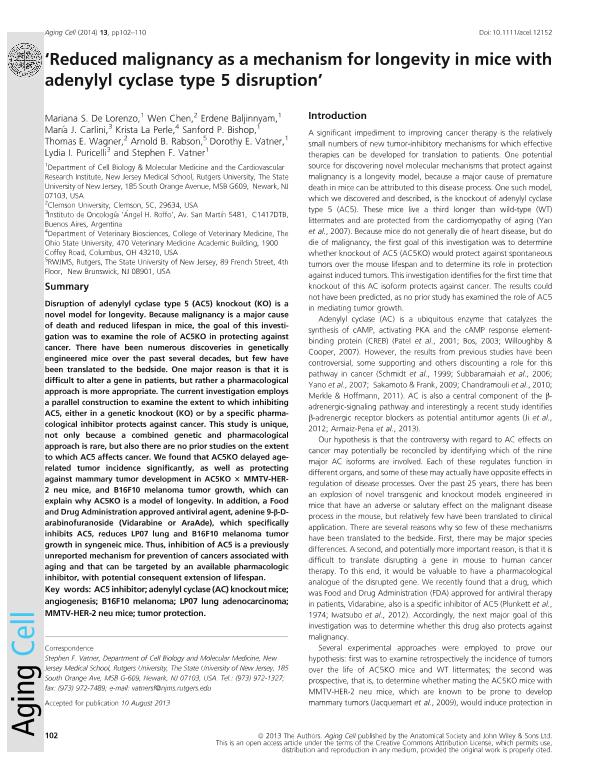Artículo
Reduced malignancy as a mechanism for longevity in mice with adenylyl cyclase type 5 disruption
De Lorenzo, Mariana S.; Chen, Wen; Baljinnyam, Erdene; Carlini, María José ; La Perle, Krista; Bishop, Sanford P.; Wagner, Thomas E.; Rabson, Arnold B.; Vatner, Dorothy E.; Puricelli, Lydia Ines
; La Perle, Krista; Bishop, Sanford P.; Wagner, Thomas E.; Rabson, Arnold B.; Vatner, Dorothy E.; Puricelli, Lydia Ines ; Vatner, Stephen F.
; Vatner, Stephen F.
 ; La Perle, Krista; Bishop, Sanford P.; Wagner, Thomas E.; Rabson, Arnold B.; Vatner, Dorothy E.; Puricelli, Lydia Ines
; La Perle, Krista; Bishop, Sanford P.; Wagner, Thomas E.; Rabson, Arnold B.; Vatner, Dorothy E.; Puricelli, Lydia Ines ; Vatner, Stephen F.
; Vatner, Stephen F.
Fecha de publicación:
02/2014
Editorial:
Wiley
Revista:
Aging Cell
ISSN:
1474-9718
Idioma:
Inglés
Tipo de recurso:
Artículo publicado
Clasificación temática:
Resumen
Disruption of adenylyl cyclase type 5 (AC5) knockout (KO) is a novel model for longevity. Because malignancy is a major cause of death and reduced lifespan in mice, the goal of this investigation was to examine the role of AC5KO in protecting against cancer. There have been numerous discoveries in genetically engineered mice over the past several decades, but few have been translated to the bedside. One major reason is that it is difficult to alter a gene in patients, but rather a pharmacological approach is more appropriate. The current investigation employs a parallel construction to examine the extent to which inhibiting AC5, either in a genetic knockout (KO) or by a specific pharmacological inhibitor protects against cancer. This study is unique, not only because a combined genetic and pharmacological approach is rare, but also there are no prior studies on the extent to which AC5 affects cancer. We found that AC5KO delayed age-related tumor incidence significantly, as well as protecting against mammary tumor development in AC5KO × MMTV-HER-2 neu mice, and B16F10 melanoma tumor growth, which can explain why AC5KO is a model of longevity. In addition, a Food and Drug Administration approved antiviral agent, adenine 9-β-D-arabinofuranoside (Vidarabine or AraAde), which specifically inhibits AC5, reduces LP07 lung and B16F10 melanoma tumor growth in syngeneic mice. Thus, inhibition of AC5 is a previously unreported mechanism for prevention of cancers associated with aging and that can be targeted by an available pharmacologic inhibitor, with potential consequent extension of lifespan.
Palabras clave:
Adenylyl Cyclase
,
Metabolism
,
Obesity
,
Tumor Protection
Archivos asociados
Licencia
Identificadores
Colecciones
Articulos(OCA HOUSSAY)
Articulos de OFICINA DE COORDINACION ADMINISTRATIVA HOUSSAY
Articulos de OFICINA DE COORDINACION ADMINISTRATIVA HOUSSAY
Citación
De Lorenzo, Mariana S.; Chen, Wen; Baljinnyam, Erdene; Carlini, María José; La Perle, Krista; et al.; Reduced malignancy as a mechanism for longevity in mice with adenylyl cyclase type 5 disruption; Wiley; Aging Cell; 13; 1; 2-2014; 102-110
Compartir
Altmétricas



